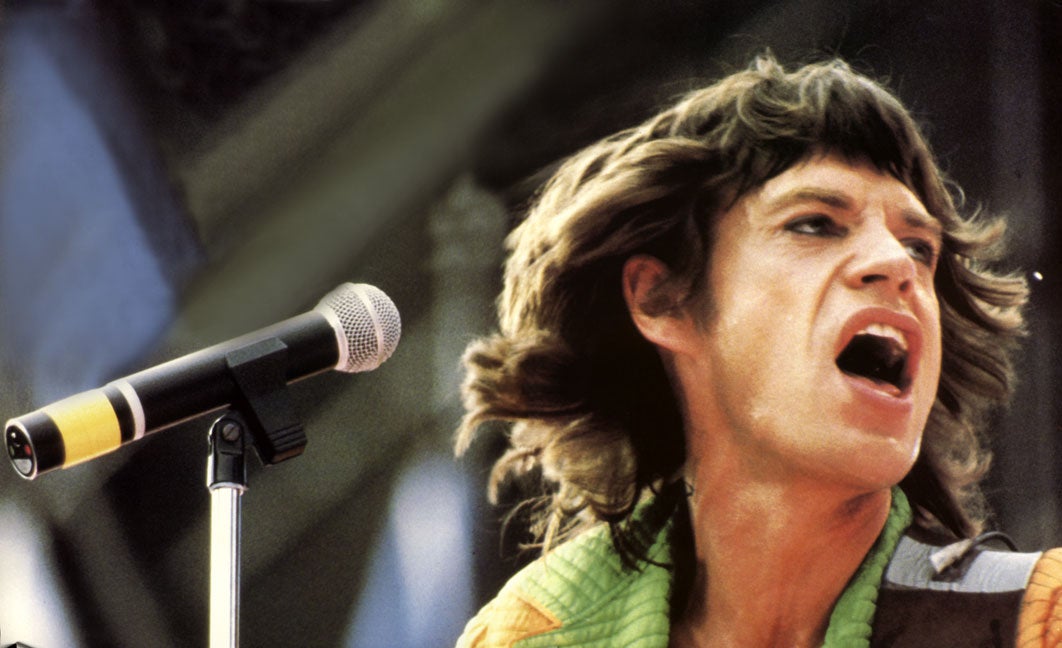
Folsom Friends I’m sitting on a plane reading the latest issue [December 2012]. I always enjoy the stories in each issue, but your story about the Rolling Stones show at Folsom really captivated me because I was there!
I remember it like it was yesterday, with a large group of friends dancing in the aisles all day. I even bought a T-shirt with my limited cash because it was advertised at the time as the “Last American Tour.” I saved that T-shirt for many years and never wore it, thinking it would be a collector’s item until it became clear that “last” is not a word the Stones understand. In time I threw the shirt away because either it got smaller or I got bigger.
Thanks again and keep up the good work.
Eric M. Corrigan (Fin’88)
Irvington, NY
Regarding the picture of Mick Jagger in the December 2012 Coloradan, three decades have passed since the 1981 Rolling Stones show in Folsom Field, but I recall Mick singing, “I said, Hey! You! Give Doug a photo credit.”
Doug Conarroe (Jour’83, MBA’04)
Editor, 1981 Coloradan yearbook
Contributor, 1982 Coloradan yearbook
Lafayette, Colo.
I enjoyed your piece on the Rolling Stones and the reprise of Doug Conarroe’s (Jour’83, MBA’04) Mick Jagger photo from the 1982 Coloradan yearbook.
I was flattered that you borrowed from my story, “A Rolling Stones Weekend” but was surprised that the 1982 Coloradan was not at least given credit. I can assure you I was the only person among those 60,000 who had a transistor radio or even remotely cared what the Buff football team was doing. Your piece gave me a reason to look back at my story and reminisce.
Good memories.
David D. Piper (Econ’82, Law’87)
Westminster, Colo.
Having a Heart
“Heart Health Gets Personal” is a very interesting item in the December 2012 issue [page 13], detailing professor Leslie Leinwand’s heart research. Below is another instance of a similar medical breakthrough in relationship to heart failure that should interest your readers.
BiDil, which is medication that treats African Americans with congestive heart failure, was the first “race-specific” prescription drug to be approved by the FDA in its history. The maker of BiDil, a biotech company called NitroMed, was incubated out of my inner-city biotech facility in Boston.
Professor Leinwand’s research is personal to me because when I played basketball at CU one year my team physical revealed a heart issue. After lengthy testing I was approved to play.
Philip S. Hart (Math, Soc’66)
Los Angeles
Stunning Views
The photography of the Coloradan is particularly stunning. Having already received four Alumni Association calendars, I’m not really in the market for another. However, might I suggest, since I assume you have the rights to the images that you make individual images available for purchase. I would think quite a few people would consider purchasing one or more. A win-win situation.
Second, for the first time I audited two classes this fall at CU-Boulder. It was a great experience! I found both professors very welcoming and talking with some of the students a good experience.
And lastly, a criticism: the title of the article on the Nobel Prize was not fair to Dr. Wineland. He won the Nobel Prize, not CU. And, as the article states, he is a “lecturer,” really an employee of NIST who collaborates with the CU faculty and staff. It certainly is a good thing for students to have access to men of his caliber, but let’s be fair to him.
Mary Ann Ganey (MEdu’72)
Boulder
Congratulations to you and your staff for putting out a very much improved Coloradan, including Paul Danish’s (Hist’65) tongue-in-cheek piece “Extracting Fields of Black Gold.”
Peter Dietze (A&S’59, Law’62)
Boulder
Football Defense
Having watched the soap opera, circus carousel of coaches in the CU football program for several decades now, I am disturbed by the darker tones rising from the firing of Jon Embree (Comm’88). Race is an awkward and complex issue in athletics. Having the “world-class” football team envisioned by CU President Bruce Benson (Geol’64, HonDocSci’04) requires both the recruitment of talented black athletes, an effort largely relegated to black assistant coaches, and an influx of large amounts of money from boosters and television contracts.
Where things get uncomfortable (and this extends to the play of black quarterbacks in pro football) is a prevailing doubt of the leadership skills of black athletes and coaches. Coach Embree was running a “clean” program, had raised the overall GPA of his young team and had the respect of his players.
Increasingly, however, a university’s image and financial backing have become tied to the “success” or failure of its football program. Embree’s teams were not very good but much of this can be attributed to the youth of his players and the obvious lack of strategy from the offensive and defensive coordinators, and no program in disarray can be righted in two years. His firing was premature, has racist undertones and is a shameful, scarring blemish on the university and its business model.
Robert Porath (A&S’69)
Boulder



